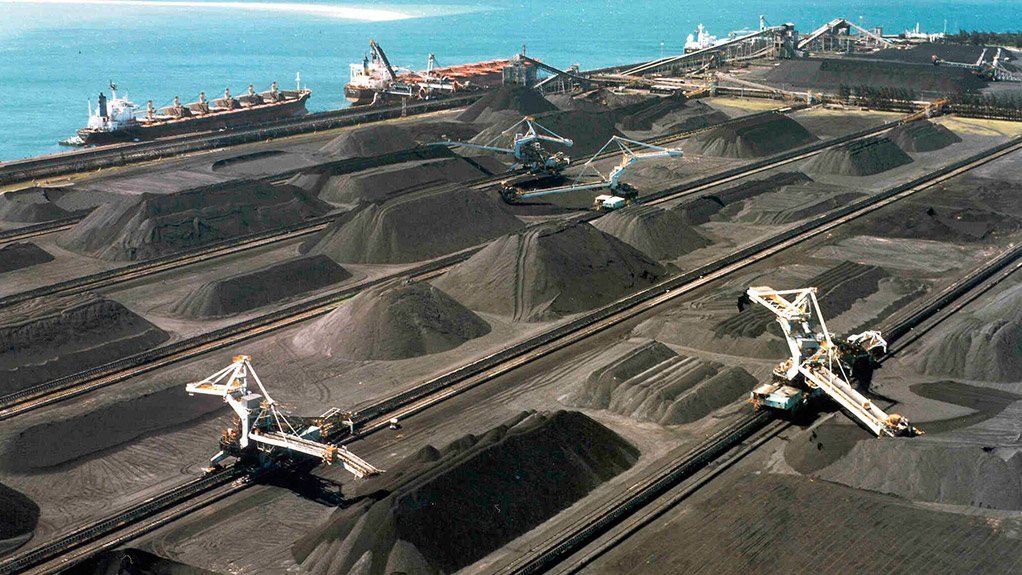JOHANNESBURG (miningweekly.com) – About 600 000 t to 700 000 t of South African coal have already moved to China since the Asian giant ceased accepting coal from Australia and more South African coal sales to China are expected “for sure”, a top trader said in an interview with Mining Weekly.
China’s power plants have been permitted to import coal from several countries without clearance restrictions, The Global Times of China has reported, which has resulted in 2021 starting on a bullish note for South African coal.
“South Africa is already benefiting from additional Chinese demand because China is increasing its imports from countries other than Australia, South Africa being one of them. At this stage, South Africa is the third-in-line beneficiary after Indonesia and Russia,” the trader added.
In 2019, exports of thermal coal to China were worth $4-billion to Australia – and the combined export revenue received by Australia from China for both thermal coal and metallurgical coal in that year totalled $13.7-billion.
While South Africa is currently not short of markets, it is entering a phase of being able to choose the best paying markets, at a time of the coal price almost doubling in the last six months. Coal was trading around the $100/t mark at the time of going to press.
The overwhelming volume of South African coal – about 40-million tonnes of roughly 70-million-tonnes-plus of coal exported a year – is continuing to go to India, with notable demand also continuing from Pakistan and Sri Lanka.
Among the main reasons cited for South Africa not being a traditional supplier of coal to China are freight differentials, which have priced it out, as well as South African coal qualities being in considerable demand elsewhere, for example, for sponge-iron production in India, where even higher prices are unlikely to exclude it.
China last bought coal from South Africa in decent volumes in 2014, after which import duties were applied and in 2015, trace element restrictions imposed.
Pro-coal commentators, in a world that is now frowning on coal, this week reported that a supply deficit for especially higher calorific value, lower sulphur, better quality coal is on its way to becoming acute.
Mining Weekly has been told that the effects of this deficit should have begun to manifest last year but were hidden by the Covid-19 outbreak.
It is estimated that the coronavirus eliminated demand for an estimated 150-million tonnes of coal in a market of a billion tonnes and probably only impacted 100-million tonnes of production.
The point is also being made that coal production was not impacted in the same way as iron-ore was in, for example, Brazil, which resulted in an overhang of coal in 2020, and a resultant price fall. With economies restarting, especially China’s, a fundamental, physical supply deficit is now emerging and prices are rising significantly.
In the pre-renewable energy years now past, such situations would have prompted announcements of large coal expansions by the major listed coal companies.
But with these companies announcing their exits from coal, and those still in coal not even investing meaningfully in sustainable capital expenditure, let alone expansionary capital expenditure, the potential for coal prices to rise to unprecedented heights is said to be considerable.
“We welcome the fact that there is no new investment because that’s going to keep the prices high,” was a leading trader’s comment to Mining Weekly.
As there are also far fewer coal analysts than in the past, financial institutions now lacked insight, he added, into the different qualities of coal from different countries, and were tending erroneously to view coal as an homogeneous commodity.
Meanwhile, Reuters reports that coal demand is also being uplifted by the colder-than-usual weather across much of north Asia as well as limited availability of spot cargoes of liquefied natural gas (LNG) for power generation.
The news agency reported on Friday that Pakistan and Bangladesh were rationing gas and buyers across South Asia were seeking alternative fuels after spot LNG prices surged to record highs. Spot LNG prices have nearly tripled since early November and are up by 1 000% since the middle of last year
Gas-fired power plants and industries across the region are scrimping on gas, with the scramble for other fuels driving up demand for liquefied petroleum and residue oil – and also coal.
EMAIL THIS ARTICLE SAVE THIS ARTICLE ARTICLE ENQUIRY
To subscribe email subscriptions@creamermedia.co.za or click here
To advertise email advertising@creamermedia.co.za or click here











